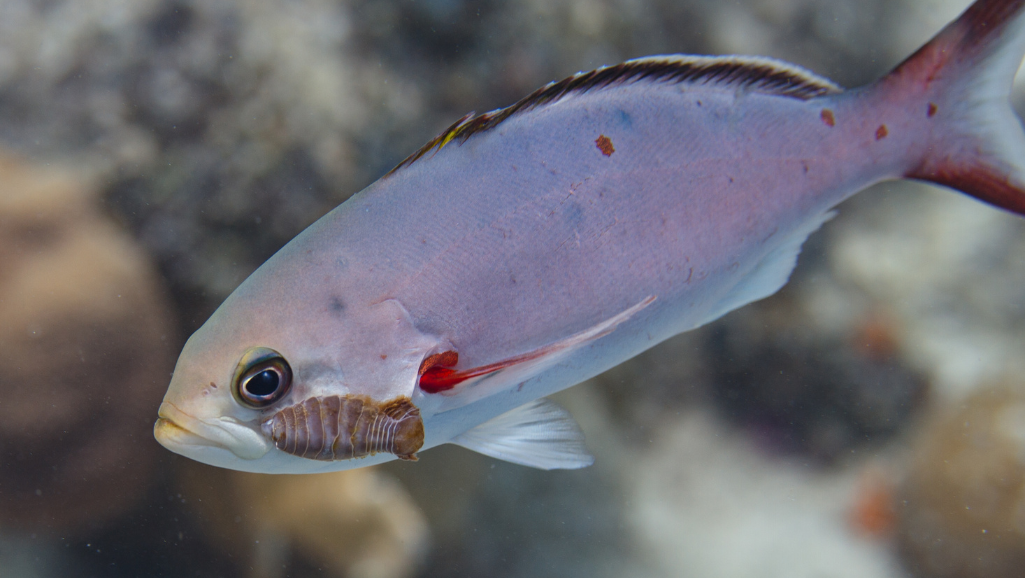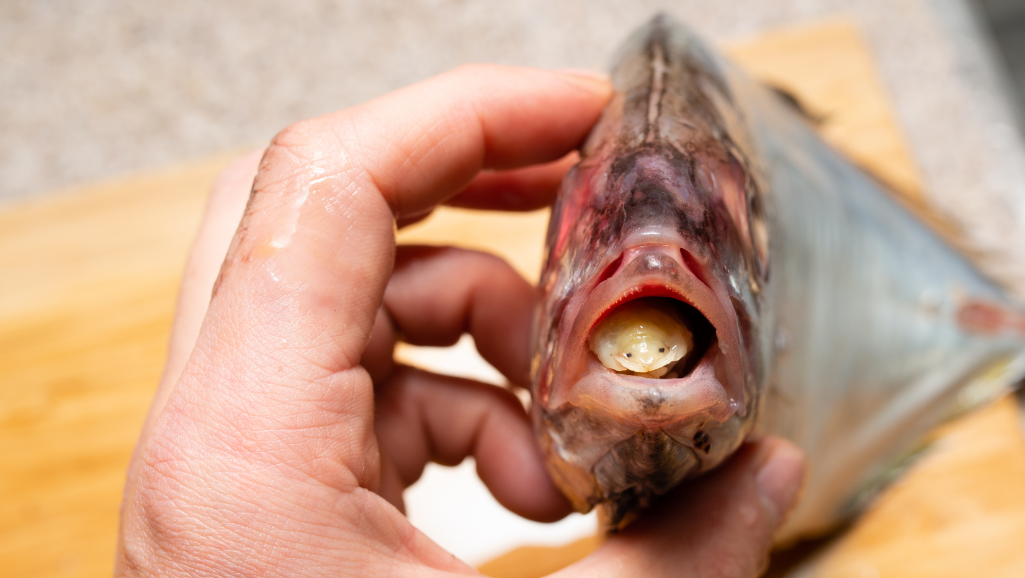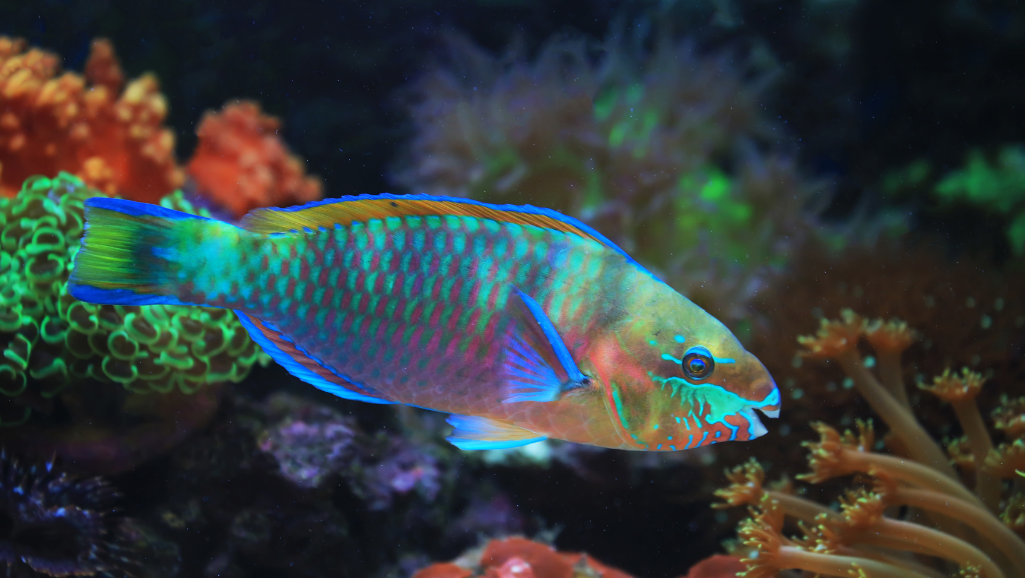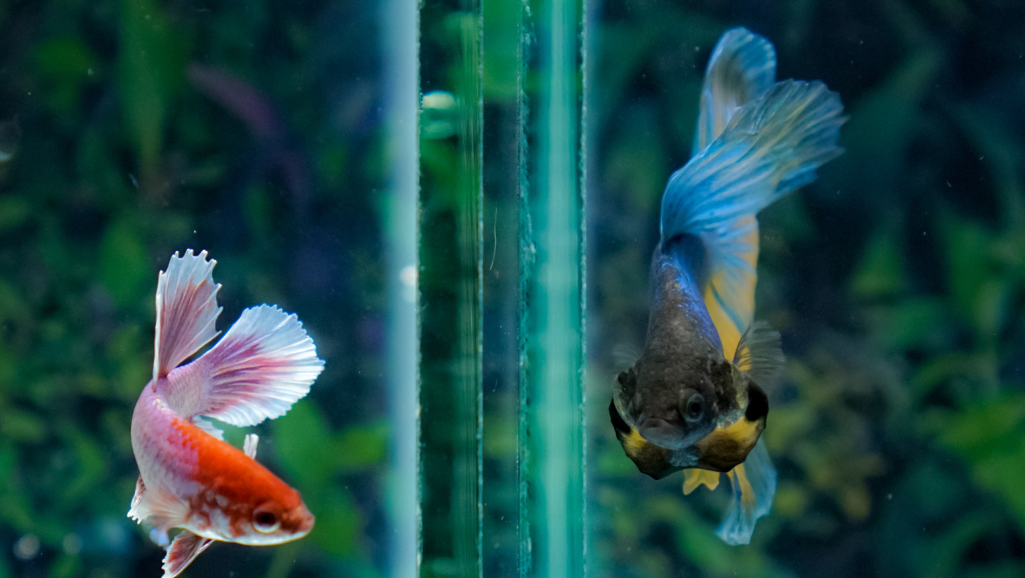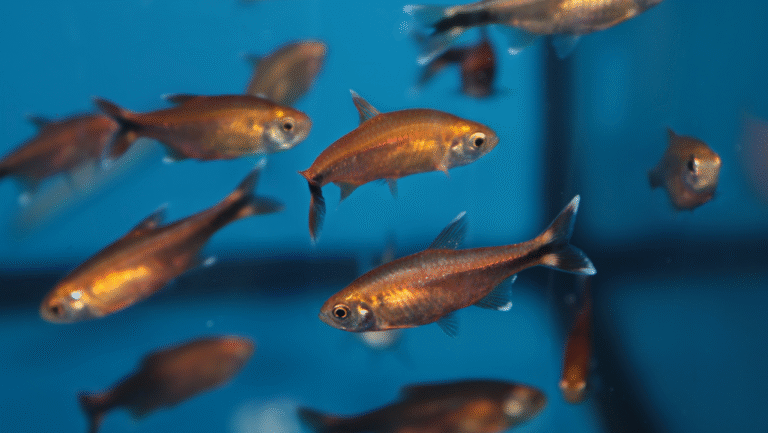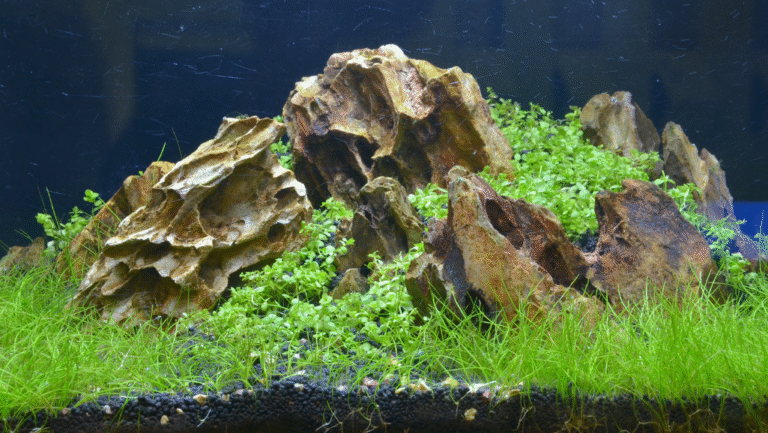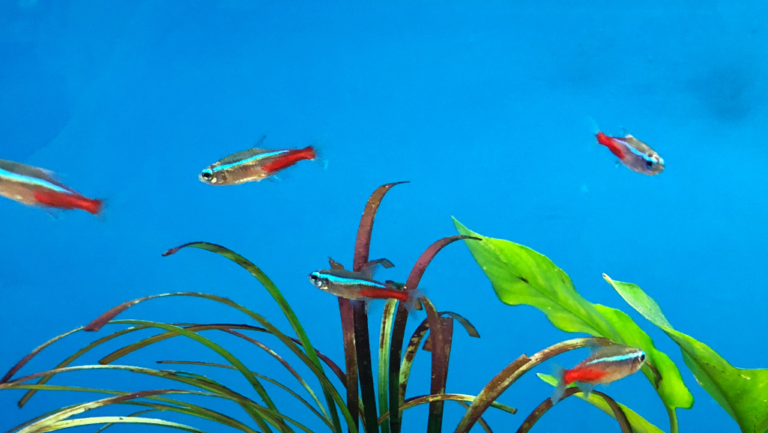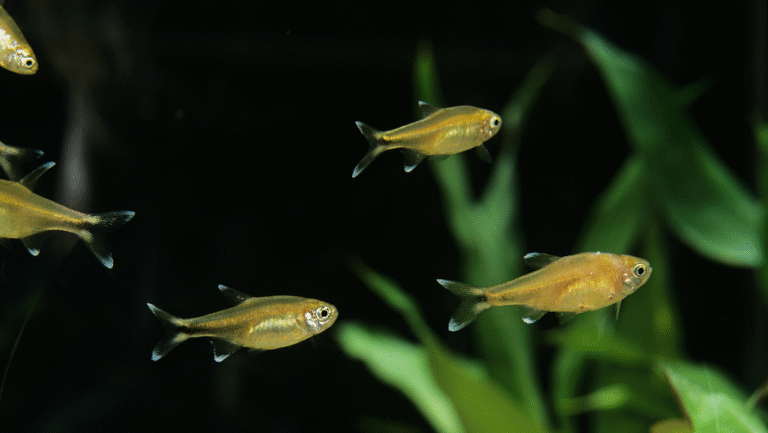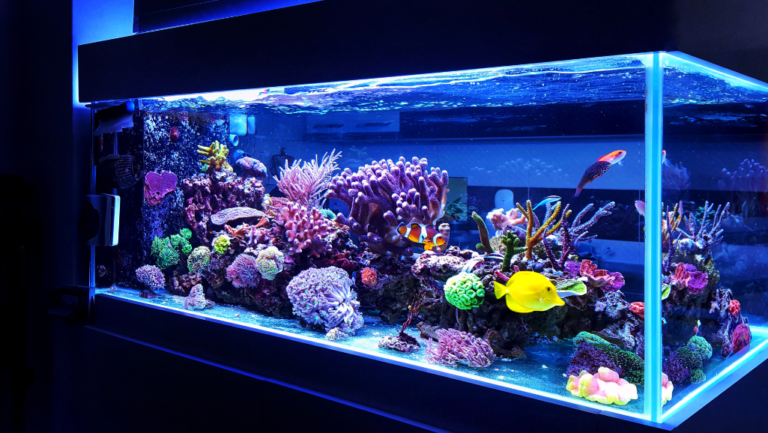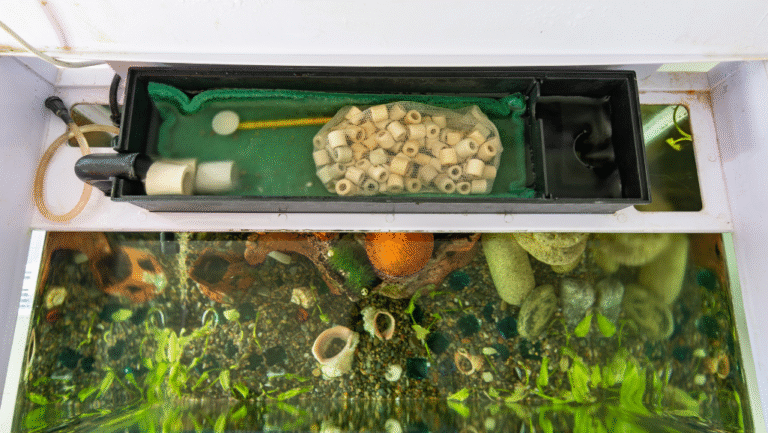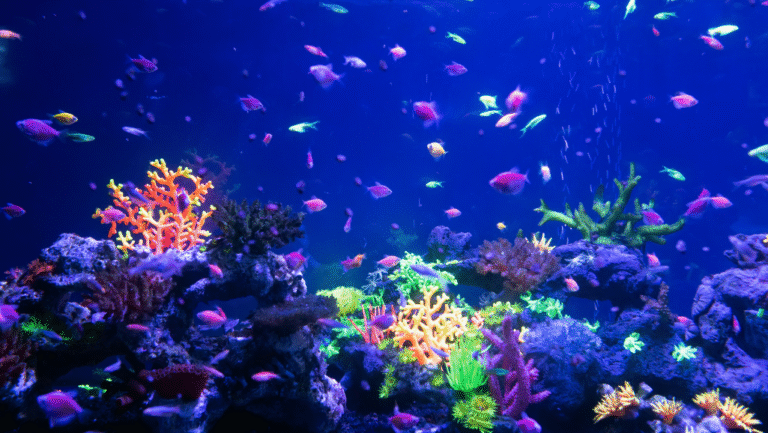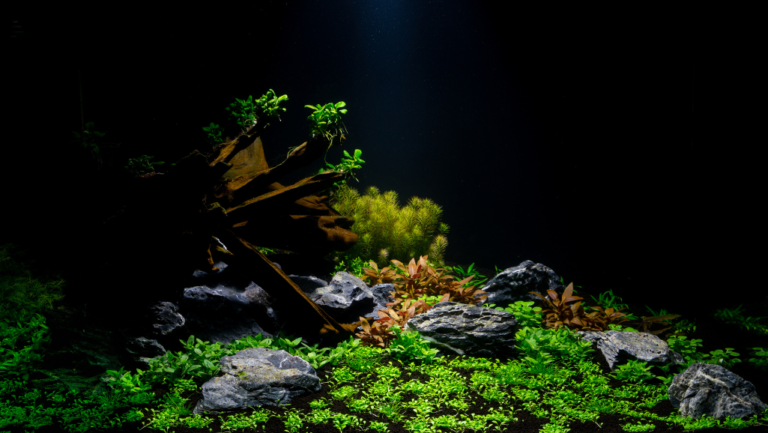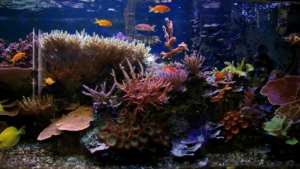Parasites can harm aquarium fish, causing health problems and even death if not treated. As a fish owner, knowing about parasites and how to treat them is key. This guide will help you identify, prevent, and treat parasites in your fish, keeping them healthy.
We’ll cover the common parasites in aquarium fish, their symptoms, and the dangers of ignoring them. You’ll learn how to diagnose, prevent, and treat parasites using both chemical and natural treatment for parasites in fish. We’ll also talk about the role of water quality, fish species, and when to get professional help. By the end, you’ll be ready to handle any parasite problems in your aquarium.
Key Takeaways
- Understand the common types of parasites that affect aquarium fish and their symptoms
- Learn about diagnostic techniques and preventative measures to avoid parasite infestations
- Discover effective chemical and natural fish parasite remedies
- Recognize the importance of water quality and fish species susceptibility in parasite management
- Know when to seek professional help from an aquatic veterinarian for persistent parasite issues
Diagnostic Techniques for Identifying Parasites
Understanding Fish Parasites: Types and Impact
As an aquarium owner, knowing about fish parasites is key. These tiny creatures can harm your fish’s health and even kill them. Learning about common parasites, their signs, and the dangers of not treating them helps you keep your tank healthy.
Common Parasites Found in Aquarium Fish
Many parasites can infect aquarium fish, including:
- Ich (Ichthyophthirius multifiliis)
- Flukes (Monogenea and Digenea)
- Anchor worms (Lernaea)
- Fish lice (Argulus)
- Velvet (Oodinium)
Each parasite is different and affects fish in unique ways. Knowing how to spot them helps you fight infestations in your tank.
Symptoms of Parasite Infestation
Fish with parasites often show signs like:
- Skin irritation and redness
- Excessive mucus production
- Lethargy and loss of appetite
- Rubbing against objects in the tank
- Visible parasites on the skin or fins
“Early detection and treatment of parasites are key to controlling parasites in aquarium fish and preventing the spread of infections throughout the tank.”
Consequences of Untreated Parasites
Ignoring parasites can harm your fish and tank. Untreated parasites can weaken fish, cause infections, damage organs, and even kill them.
- Weakened immune systems
- Secondary bacterial and fungal infections
- Organ damage and failure
- Reduced growth and reproductive success
- Increased mortality rates
Eliminating parasites in fish tanks is vital for your fish’s health. Watch for signs of parasites and act fast to keep your tank healthy and thriving.
Early detection is key in fighting parasitic infections in fish. Spotting parasites early helps aquarium owners protect their pets. There are many ways to find parasites in fish, each with its own benefits.
Visual Inspection Methods
Looking closely at your fish is a simple way to find parasites. Watch for signs like:
- Lethargy or loss of appetite
- Rubbing against objects in the tank
- Visible lesions, bumps, or discoloration on the skin
- Frayed or clamped fins
“A keen eye can be an aquarist’s best tool in the fight against parasites.” – Dr. Emily Johnson, Aquatic Veterinarian
Microscopic Examination
Looking at skin scrapings or gill clippings under a microscope can show tiny parasites. This method helps identify the exact parasite, making it easier to treat your fish.
Using Diagnostic Kits
There are also kits to help find parasites in your tank. These kits test water or fish waste for parasite signs. While not as detailed as a microscope, they’re handy for regular checks.
Using visual checks, microscopic looks, and kits together helps keep your fish healthy. This way, you can fight off parasites and keep your fish safe.
Preventative Measures to Avoid Parasite Infestation
Protecting your fish from parasites starts with prevention. By taking proactive steps, you can lower the chance of parasites in your aquarium. Here are some ways to keep your fish healthy and free from parasites.
Quarantining New Fish
Quarantining new fish is a key step to prevent parasites. Isolate new fish for 2-4 weeks to watch for signs of parasites. This way, you can treat any new arrivals before adding them to your main tank. It keeps your existing fish safe from parasites.
Maintaining Clean Tank Conditions
A clean aquarium is vital for fighting parasites. Regular water changes and good filtration help keep the tank clean. Remove uneaten food and waste quickly to keep water quality high. Also, avoid overfeeding to prevent poor water conditions and parasite growth.
Regular Health Checks
Regular health checks are important for your fish’s well-being. Watch your fish for signs of illness or parasites. Look for lethargy, loss of appetite, rapid breathing, and visible wounds. Early detection allows for quick treatment and prevents infections from spreading.
“An ounce of prevention is worth a pound of cure.” – Benjamin Franklin
Being proactive in preventing parasites is best for your fish’s health. Quarantine new fish, keep your tank clean, and check your fish regularly. These steps will help you avoid parasites and keep your aquarium thriving.
Chemical Treatments for Fish Parasites
Chemical treatments are often the best way to fight fish parasites. Anti-parasitic medications for fish target and kill many types of parasites. You can find these medications at pet stores and online.
It’s important to know the right dosage and how to use the medication. Too much can harm your fish, and too little won’t work. Always follow the instructions and talk to a vet if you’re unsure.
Overview of Antiparasitic Medications
There are many anti-parasitic medications for fish. Some common ones include:
- Praziquantel: Effective against tapeworms and flukes
- Metronidazole: Treats hexamita, spironucleus, and other protozoal infections
- Fenbendazole: Eliminates nematodes and other worm-like parasites
- Malachite Green: A potent anti-parasitic solution for external parasites
Dosage and Administration Guidelines
When using anti-parasitic medications, follow the dosage instructions carefully. Most are added to the water, while some need medicated food or baths. Make sure to remove any activated carbon from your filter before treatment.
Always read and follow the manufacturer’s instructions carefully to ensure the safety and effectiveness of the treatment.
Safety Precautions During Treatment
It’s important to be safe when treating your fish. Here are some key tips:
- Wear gloves when handling medications to avoid skin contact
- Keep medications out of reach of children and pets
- Monitor your fish closely for any adverse reactions
- Perform water changes as directed to remove medication residue
By using anti-parasitic medications correctly and following safety tips, you can treat fish parasites effectively. This will help keep your aquatic pets healthy.
Natural Remedies for Treating Fish Parasites
Many aquarium owners choose natural remedies to fight parasites in their fish before using chemicals. These methods are kinder to fish and the environment. They can also help get rid of parasites.
Herbs like garlic and neem are known for fighting parasites. Garlic has compounds that help fight off parasites and boost the fish’s immune system. Neem, from the neem tree, has been used for centuries to treat many health issues, including parasites.
Essential Oils as Antiparasitic Solutions
Essential oils, like tea tree, clove, and lavender, are also good for fighting parasites. They have compounds that can stop parasites from growing. But, it’s important to use them carefully and correctly, as they can be strong.
Epsom Salt Baths
Epsom salt baths are another natural way to treat parasites. Epsom salt, or magnesium sulfate, can kill parasites. By soaking infected fish in a bath of Epsom salt, you can help them heal. This method also helps reduce stress and improves fish health.
“Natural remedies offer a gentler approach to treating fish parasites, but it is essential to research and follow proper guidelines to ensure the safety and well-being of your aquatic pets.”
Remember, each fish species reacts differently to treatments. Always talk to an aquarium expert or vet before trying new treatments. By using natural remedies and keeping your tank clean, you can keep your fish healthy and parasite-free.
Importance of Water Quality in Treating Parasites
Keeping your fish tank water quality right is key to getting rid of parasites. The health of your fish depends on the balance of water parameters like pH, temperature, and ammonia levels.
Good water quality management stops parasites and helps in treating them. By watching and adjusting these parameters, you make your tank less welcoming to parasites. This helps your fish get better.
Effects of pH and Temperature
The pH and temperature of your tank water are very important for parasite treatments. Most treatments work best in certain pH and temperature ranges. For example, some treatments need a slightly acidic pH, while others work better in neutral or slightly alkaline conditions.
Temperature also affects parasites. Certain parasites do well in warmer water, while others prefer cooler water. Keeping the right temperature for your fish and treatment helps get rid of parasites better.
Role of Ammonia and Nitrite Levels
Ammonia and nitrite are harmful to fish and can weaken their immune system. High levels make fish more likely to get parasites and harder to fight off infections.
“Regularly testing your water for ammonia and nitrite levels is essential for maintaining a healthy aquarium environment and preventing parasite outbreaks.”
Maintenance of Water Parameters
To keep your tank water perfect for treating parasites and keeping fish healthy, follow these tips:
- Do regular water changes to remove harmful stuff
- Use a good water testing kit to check pH, ammonia, nitrite, and nitrate levels
- Use effective filters to keep water quality and flow good
- Avoid overfeeding to prevent poor water quality
By focusing on water quality and keeping parameters stable, you make your tank healthier. This boosts your chances of getting rid of parasites and worms in your fish tank.
Fish Species and Their Susceptibility to Parasites
Understanding aquarium fish deworming and parasite treatment is key. Different fish species face different parasite risks. Their environment and natural defenses play big roles in this.
Freshwater vs. Saltwater Fish
Freshwater fish are more at risk for parasites. This is because their environment has more organic matter, which parasites love. Saltwater fish, on the other hand, have salt’s natural antiseptic powers. This makes them less likely to get some parasites.
Tropical Fish Vulnerabilities
Tropical fish, popular in home tanks, are very vulnerable to parasites. These fish come from delicate ecosystems. Any changes in their environment can make them more open to parasites. Keeping their water conditions just right is key to stopping and treating parasites in tropical fish.
Breeds Known for Resilience
Some fish breeds are naturally better at fighting off parasites. For example:
- Guppies: These fish are very hardy and can handle different water conditions. This makes them less likely to get parasites.
- Zebra Danios: These fish are very adaptable and resilient. They are less likely to get sick from parasites compared to other tropical fish.
“Understanding the unique vulnerabilities and strengths of different fish species is key to effectively preventing and treating parasitic infections in aquariums.”
Choosing fish breeds that are naturally strong and keeping the water perfect can help. This way, aquarium lovers can lower the chance of parasites and keep their fish healthy for a long time.
Recurring Parasite Issues: Causes and Solutions
Even with our best efforts, parasites can keep coming back. This can be really frustrating for those who care for aquariums. But, knowing why and how to solve these problems can help.
Poor tank management often leads to recurring parasites. Not changing the water enough, having too many fish, and not cleaning filters and substrates can help parasites grow. Keeping the water clean and not overfeeding is key to stopping parasites from coming back.
Impact of Stress on Fish Health
Stress makes fish more likely to get parasites. Poor water, fighting with other fish, or bad food weakens their immune system. This makes it easier for parasites to infect them.
Keeping your fish calm and well-cared for helps them fight off parasites better.
Reinfection Prevention Strategies
To stop parasites from coming back, you need to prevent reinfection. After treating your fish, do these things:
- Clean and disinfect the whole tank, including decorations and equipment
- Change the filter media to get rid of parasite eggs or larvae
- Quarantine new fish before adding them to the main tank
- Check your fish’s health often and treat any sickness quickly
By being careful and active in preventing parasites, you can keep your aquarium healthy and full of life.
Integrative Approaches to Parasite Management
Managing parasites in fish requires a mix of strategies. This includes using both chemical and natural treatments. It also means improving their diet and working with experienced vets. These steps help keep fish healthy and happy.
Combining Chemical and Natural Treatments
Anti-parasitic medications for fish work well but can stress them out. Natural remedies like garlic and neem can help. They boost the fish’s natural defenses when used with medication.
“The key to successful parasite management in fish is finding the right balance between chemical and natural approaches, tailored to the specific needs of each individual case.” – Dr. Emily Johnson, Aquatic Veterinarian
The Role of Diet in Health Maintenance
A good diet is key to keeping fish healthy. It should be rich in nutrients and vitamins. This helps them fight off parasites better.
Adding immune-boosters like probiotics and vitamin C can also help. These supplements make fish more resistant to infections.
Collaborating with Aquatic Veterinarians
For tough parasite problems, see an aquatic vet. They know the best effective anti-parasitic solutions for fish. They consider the parasite type, fish species, and aquarium health.
Working with a vet helps create a treatment plan. This plan aims to get rid of parasites safely and effectively.
When to Seek Professional Help for Fish Parasites
Knowing when to handle fish parasites yourself and when to get help is key. Many cases can be solved with the right fish parasite remedies and prevention. But, some situations need a vet’s expertise.
Signs That Require Expert Intervention
If you see these signs in your fish, it’s time to get a vet:
- Severe infestation with visible parasites
- Rapid deterioration of fish health
- Unresponsive to over-the-counter treatments
- Unusual behavior or loss of appetite
These signs might mean a serious problem that needs special care and fish parasite remedies.
Finding a Qualified Aquatic Vet
Finding a good aquatic vet is important for your fish’s health. Here are some tips:
- Ask other aquarists or local fish stores for recommendations
- Look online or check veterinary associations
- Make sure they know about controlling parasites in aquarium fish
A knowledgeable aquatic vet can provide invaluable guidance and support during parasite outbreaks.
Questions to Ask Your Veterinarian
When you talk to a vet, have questions ready for the best advice:
- What specific tests are needed to diagnose the parasite issue?
- What are the most effective fish parasite remedies for my situation?
- How can I prevent future outbreaks and maintain optimal tank conditions?
- Are there any possible side effects or risks with the treatments?
Talking openly with your vet helps create a plan to keep your fish healthy and free from parasites.
Post-Treatment Care for Affected Fish
After eliminating parasites in fish tanks, it’s key to care for your fish well. This means watching them closely, feeding them right, and noticing any changes in how they act.
Monitoring Recovery and Re-introduction
Watch your fish closely after treatment. Look at how they swim, eat, and act. Slowly put them back in the tank, making sure the water is good for them.
Nutritional Support Post-Treatment
Give your fish food that’s full of nutrients to help them get strong. Use high-quality fish food and add vitamins and minerals if your vet says so. Good food is very important for their recovery.
“Feeding your fish a well-balanced diet after treatment is essential for their recovery and long-term health.”
Behavioral Changes to Watch For
Keep an eye out for odd behaviors in your fish after treatment. Look for signs like:
- Lethargy or decreased activity levels
- Loss of appetite or refusal to eat
- Abnormal swimming patterns or difficulty maintaining balance
- Increased hiding or isolation from other fish
If your fish act strangely for a long time, talk to your vet. They can help with more care and treatment.
The Future of Fish Parasite Treatments
Our knowledge of aquatic health is growing fast. This means we have more ways to treat parasites in fish. New methods are being found to fight off these pests in aquarium fish. This leads to better care for our fish friends.
Emerging Research on Parasite Control
Scientists are looking into new ways to fight fish parasites. They’re working on special medicines and natural remedies. Their goal is to keep fish healthy and avoid drug resistance. Soon, we’ll have better ways to deworm our fish.
Innovations in Aquaculture Practices
New tech is changing how we care for fish. Better filters and water quality monitors are key. These tools help keep fish healthy and prevent parasites. They’re good for both home aquariums and big fish farms.
Sustainable Approaches to Fish Health Management
The aquarium world is going green. Natural treatments like herbs and essential oils are becoming popular. They’re good for fish and the planet. Using these methods helps keep our fish and oceans healthy for the future.
